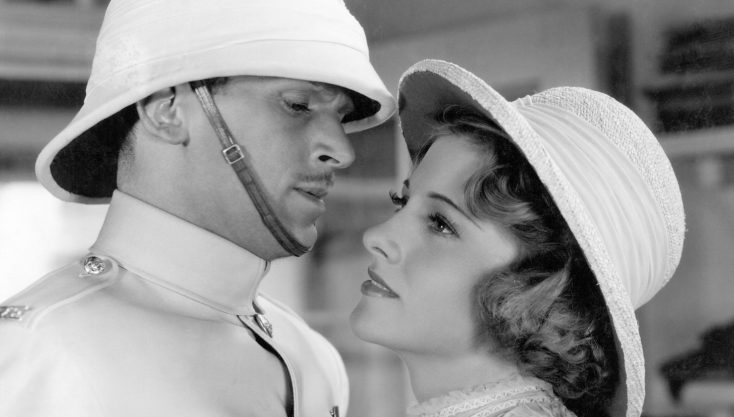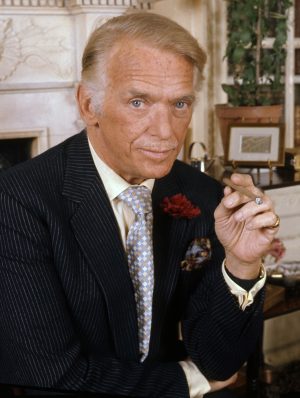BY JUDY SLOANE
Front Row Features
HOLLYWOOD-Son of Douglas Fairbanks, the iconic silent movie star, Douglas Fairbanks Jr. created a thriving career for himself as an actor and producer. During World War II, he was awarded the United States Navy’s Legion of Merit for valor, finally retiring from the US Naval Reserve in 1954.
In the first part of my interview with him, we discussed growing up in Hollywood and his relationship with his father and stepmother, Mary Pickford. In the second part of our conversation we talked about his successful career, including his movies “Gunga Din,” in which he co-starred with Cary Grant, and “The Prisoner of Zenda,” which starred Ronald Colman.
Judy Sloane: When did you know that you wanted to be an actor yourself?
Douglas Fairbanks Jr.: When my mother’s family had run out of money and we didn’t know quite what to do. Somebody offered me a job at Paramount Pictures to play in a film called “Stephen Steps Out,” for which I got $1000 a week for two weeks. I didn’t make anything again for months and months. The next time, I was hired back at $200 a week to be in the stock company to play anything that came along.
Judy Sloane: What are your memories of your first big success, “Dawn Patrol,” which was made in 1930?
Douglas Fairbanks Jr.: I was very grateful to Richard Barthelmess who was the star of it, who insisted I play this wonderful role, which was actually better than the star part as it turned out. That was followed by “Little Caesar,” (with Edward G. Robinson). It was a very lucky streak for me.
Judy Sloane: What do you remember about making “Gunga Din?”
Douglas Fairbanks Jr.: “Gunga Din” was a good action movie. I saw it recently on TV and it holds up pretty well. I was talking with some friends, including the director’s son, George Stevens Jr., about what we would have done if we were able to do it again now? And I don’t think we’d make any changes. I do remember that halfway through the company sent us a telegram out on the desert where we were filming saying that they didn’t like the rushes that we’d sent in. They said we were just spending good money after bad and to close everything down, discharge everybody and come back. We knew we were on to something good, but we also knew that until they put the bits and pieces together they wouldn’t be able to see how good it was going to be. So we decided that we didn’t receive the telegram and just tore it up!
Judy Sloane: Rupert of Hentzau in “The Prisoner of Zenda” was one of your greatest roles.
Douglas Fairbanks Jr.: It was a wonderful part. In fact I didn’t know whether to accept it or not, because I’d been struggling for years to have my own company, and at last I’d managed to con a few gullible people into backing me over in Europe, and I was just getting started on that. Then I had this offer to come back and do “Prisoner of Zenda.” It had been made twice as a silent movie and always the character of Count Rupert of Hentzau was, although not an enormous part, still the best part. He was the most enjoyable and engaging villain, and always came out better than the hero. So I was tempted by that, but I thought I’d better stick with the new company. My father was around and he said, ‘Don’t be a fool, you’ve got to go back, give up everything and play in “The Prisoner of Zenda” regardless of who is the star, or how small your part is. It’s still the best part ever written.’ He said, ‘It’s an actor-proof role. It is so good Lassie the dog could play the part and walk away with it.’ And that decided me, so I said ‘Yes, I will.’
Judy Sloane: In “The Corsican Brothers” you played twins – what’s your memory of that experience?
Douglas Fairbanks Jr.: It should have been better, and had we had a bigger budget we would have done a lot of things differently. We were also in a hurry because I was already in the Naval Reserve and, although the United States was not yet officially in the war, the US Navy was in the war ahead of the country. We were escorting convoys across the Atlantic, and I was anxious to go on active duty, because I felt very keenly about the war and had been making speeches and forming organizations for the support of the allies. That was taking priority over any other considerations. So we rushed through “The Corsican Brothers” as quickly as we could.
Judy Sloane: You had a strange thing happen to you on the set of the film “Chances,” which was made in 1931, can you talk about that?
Douglas Fairbanks Jr.: Yes. We were on location having lunch and I had a little portable radio, and so I decided to turn it on and listen to the midday news. I suddenly heard among news flashes that I had been killed in a motor accident on the way to Santa Barbara, California. We were miles and miles away from Santa Barbara and I was perfectly alright, but it was the weirdest sensation to hear a report of yourself being killed. An amusing sideline to the story was that when they got word of it, many of the studios stopped for 2 minutes of silence and people were chosen to say a little prayer for me. When they heard that I was perfectly alright, they all felt so darn silly. It was sort of nice to know they would take the trouble.
Judy Sloane: Did you ever find out where the report came from?
Douglas Fairbanks Jr.: I never did.
Judy Sloane: I know you were a great friend of Laurence Olivier. You played some awful practical jokes on him. Can you tell about any of them?
Douglas Fairbanks Jr.: I had him thrown into jail once in Mexico! We were on a fishing trip, and I bribed the local head of this village to throw this friend of mine into this one-cell jail and fine him 20,000 pesos for being an Englishman. That was his only sin. I remember Larry getting indignant and saying, ‘What do you mean being an Englishman? I’m proud of it. There’s no law against. I want to see the British Council.’ They said, ‘We don’t recognize Britain!’ We let him stay there about 20 minutes. When he got out he was so wonderful – he roared with laughter.
Note: Interesting fact- Fairbanks Jr. was married to actress Joan Crawford from 1929 to 1933.
Portions of this article were first published in Film Review Magazine






